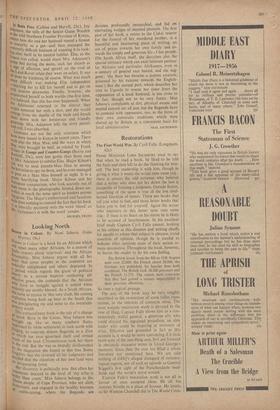Looking North
awn in Colour. By Noni Jabavu. (John b Murray, 18s.) 1,:(1,491 in Colour is a book by an African which 111 upset many other Africans. In a season of facile oratory about `nOritutle' and the African bersonality, Miss Jabavu argues with all her naturally that some peoples in the continent are aaturally enlightened and others depraved. In iibPeriod which regards the grant of political etrertY as a second baptism conferring all- y,`eetive grace, she contends that the Africans 0'1.0 have to struggle against a settled white shill()ritY are doubly blessed. As a South African, explosion to rejoice in 'this very clash, the coming was being built up here in the South that e precipitating me and mine to the twentieth- entury World. This extraordinary book is the tale of a change of n'ind. Born in the Union, Miss Jabavu was (:,,Ought up, like so many southern Bantu oppressed by white settlement, to look north with ttillging, to venerate distant Buganda as a Zion which her race governed itself and owned much of the land. Circumstances took her there 'ne end. But shc was so brutally disillusioned h the stagnation she found in this free Bantu kingdom that she reversed all her judgments and an invigorating that the injustices of her own land were 1,,invigorating force. tiler discovery is politically true. But often her bo'guMents descend to the level of 'my tribe is N,t_ter than yours.' MisS Jabavu belongs to the til°sa people of Cape Province, who are alert, Ofnlocratic, and engaged in the healthy business cattle-raising, where the Baganda are
devious, profoundly monarchial, and fed on
enervating wodges of steamed plantain. The first part of her book, a return to the Ciskei reserve for the funeral of her murdered brother, is a beautiful and fascinating piece of writing, an act of praise towards her own family and to- wards the simple and generous life cf her people. (On South Africa itself, she describes also the special intimacy which can exist between particu- lar Africans and particular Afrikaners, even in a century of general race hatred, and she sug- gests: 'the Boer has became a jealous creature, poisoned by his rancour towards the English- man.') But the second part, which describes her visit to Uganda to rescue her sister from the oppressions of a local husband, is too cross to be fair, though not to be very funny. Miss Jabavu's complaints at dirt, physical excess and mental conceit are all just, but the Baganda have to contend with oppressors, too, in the form of their own autocratic traditions which were shored up by Britain as a convenient basis for










































 Previous page
Previous page